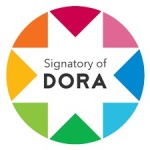Impact of team Work on developing organizational trust: A case study of the Faculty of Economic and Commercial Sciences and Management Sciences at Laghouat University
Abstract
The paper aimed to study the impact of the team work on the development of organizational trust, case study of the professors of the Faculty of Economic and Commercial Sciences and Management Sciences in university "Amar Thelidji" Laghouat, a sample of 48 out of 124 single professor composed macro community, The study found the following: Most of the faculty professors exercising a lot of tasks in the form of team work; Acceptable level of organizational trust among professors towards colleagues and supervisors; There is statistical significance of the impact of the team work on the organizational trust, in addition to the estimated correlation (0.54) and the change in organizational trust is interpreted by the work team at 30%.
Downloads
References
Erden, F. & Ozen.J, Cognitive and Affective Dimensions of Trust in Developing Team Performance, Team Performance Management, Vol 9, N° 6, USA, 1996,p 132.
Rousseau. D, et al, Not so Different After all: A Cross-discipline View of Trust, Academy of Management Review, Vol 23, N° 3, USA, 1998, pp 393-404.
Costa. A, Work Team Trust and Effectiveness, Personnel Review, Vol 32, N° 5, 2003,pp 605-622
Fukuyama.F, Trust: Social Virtues and the Creation of Prosperity, Free Press, NY,1995, p 88.
Usoro.A, et al, Trust as an antecedent to knowledge sharing in virtual communities of practice, Knowledge Management Research & Practice, Vol 5, N°3, USA, 2007, pp 199-212.
Mayer.G et al, An integrative organization trust: past, present and future, Academy of management review, Vol 32. N°2, 2007, p 347.
Pillai.C & Williams. E, Fairness Perceptions and Trust as Mediator for Transformational and Transactional Leadership A two Sample Study, Journal of Management, Vol25, No6,USA, 1999, p 898
Robbins.P, Organizational Behavior, 10thédition, Prentice¬-Hall, Inc, New Jersey, 2003, p 337.
Gupta.A.K & Becerra. M, Perceived trust worthiness within the organization: The moderating impact of communication frequency on trust or and trustee effects, Organization Science, Vol 14, N°1, USA, 2003, p 34
Dirk. K& Ferrin.T, Trust in Leadership : Meta Analytic Findings and Implications for Research Practices, Journal of Applied psychology, Vol 87, N° 8, USA, 2002, p 113.
Leana.G.R & Van Buren. I, Organizational Social Capital and Employment practices, Academy of Management Review, Vol 24,N°3, USA, 1999, p 547
Prusak.L & Cohen. D, How To Invest In Social Capital, Harvard Business Review , Boston, 2001, pp 86-93 .
Jarvenpaa.S.L et al, Toward Contextualized Theories of Trust: The Role of Trust in Global Virtual Teams, Information Systems Research, Vol 15, No 3, USA, 2004, pp 250-267
أحمد بن حسن الزهراني، الثقة التنظيمية لدى مديري المدارس الثانوية بالطائف وعلاقتها بالسلوك الإداري الإبداعي، رسالة ماجستير في إدارة الإعمال، جامعة أم القرى -المملكة العربية السعودية، 2011 ص 17.
Green. R, Measuring good will Trust between group of people, the years of an oil industry alliance, Strategic change, Chichester, Vol 12, N°7, 2003, p 369
جمعة أشرف فضيل، مقدمة الجدارة، مؤسسة الشرق الأوسط للتنمية الإدارية، السعودية، 2006، ص 137.
Das T.K & Teng B.C, Trust control and risk in strategic alliances: An integrated framework, Organization studies, Vol 22, USA, 2001, pp 257-258.
Kramer, R. M & Tyler T.R, Trust in organizations: Frontiers of theory and research, Thousand Oaks, Sage Publications, California, 1996,p 310.
Muthusamy.S.K & White. M.A, Learning and knowledge transfer in strategic alliances: A social exchange view, Organization Studies, Vol 26, N° 3, USA, 2005, pp 415-441.
Szulanski. G et al, When and How Trust worthiness Matters: Knowledge Transfer and the Moderating Effect of Causal Ambiguity, Organization Science, Vol 15, N°5, USA, 2004,pp 600-613.
Blau. P. M, Exchange and power in social life, John Wiley, N Y, 1964, p 94.
Sitkin.S.B & Roth. N.L, Explaining the limited effectiveness of legalistic remedies for trust/distrust, Organization Science, Vol 4, N°7, USA, 1993, pp 367-392.
مصطفى أحمد السيد، المدير ومهاراته السلوكية، المكتبة الأكاديمية، القاهرة، 2005، ص 151.
Barker.A, How to be better at management people, Kogan page limited, London, 2000, p 145.
Gordon.j, Work team: How far have they come?, training, oct, 1992, p 76.
سالم سعيد القحطاني، مدى استعداد المديرين لاستخدام فرق العمل في الأجهزة الحكومية: دراسة استطلاعية على الأجهزة الإدارية المركزية بالرياض، مجلة معهد الإدارة العامة، الرياض، 2005، ص ص 149-150.
دورلنغ كندرسلي، ديناميات العمل كفريق، ترجمة مكتبة لبنان ناشرون، بيروت، 2001، ص 13.
عايد عبد الله العصيمي، إتجاهات المديرين حول مدى تطبيق مفهوم بناء فرق العمل الفعالة في الأجهزة الحكومية، رسالة ماجستير، جامعة الملك سعود، الرياض، 2003، ص 13.
محمد محسن القرني، اتجاهات الضباط نحو السمات والمهارات القيادية، دراسة تطبيقية على ضباط المديرية العامة للدفاع المدني بالمملكة العربية السعودية، رسالة ماجستير، جامعة نايف للعلوم الأمنية، الرياض، 2005، ص 46.
عادل الرشيد، فريد حداد، دراسة ميدانية لإتجاهات المديرين المعينين في منظمات الأعمال الأردنية، مجلة أبحاث اليرموك، المجلد 17، العدد 2، اليرموك، 2000، ص 341.

This work is licensed under a Creative Commons Attribution-NonCommercial 4.0 International License.















